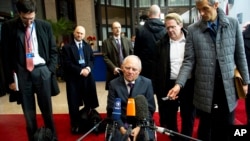Economic growth in Europe's 17-nation euro currency bloc has nearly stalled again, only months after it emerged from a recession that lasted 1.5 years.
The eurozone said Thursday that its economy expanded just 0.1 percent in the July to September period, down from the gain of 0.3 percent in the previous quarter.
With record high unemployment and some debt-ridden governments struggling to regain their financial footing, the eurozone's fortunes have faltered even as the world's two biggest economies, the United States and China, have advanced.
In the third quarter, the eurozone said that growth slowed markedly in Germany, its most powerful economy, to three-tenths of a percent, less than half what it had been. Growth contracted slightly in both France and Italy, the eurozone's next two biggest economies.
The eurozone economy, collectively the biggest in the world, shrank for six straight quarters through March of this year, the longest drop since the euro was introduced in 1999. Analysts said slowing exports led to the sluggish growth in the third quarter, while austerity measures undertaken in several eurozone countries have cut government spending.
Even with the limited growth across the eurozone, one of its member nations, Ireland, said it is about to emerge from the $114 billion bailout it secured in 2010. Dublin said that next month, it will become the first of the four eurozone nations that needed a rescue package to be able again to borrow money on international markets without the safety net of a precautionary credit line.
The eurozone said Thursday that its economy expanded just 0.1 percent in the July to September period, down from the gain of 0.3 percent in the previous quarter.
With record high unemployment and some debt-ridden governments struggling to regain their financial footing, the eurozone's fortunes have faltered even as the world's two biggest economies, the United States and China, have advanced.
In the third quarter, the eurozone said that growth slowed markedly in Germany, its most powerful economy, to three-tenths of a percent, less than half what it had been. Growth contracted slightly in both France and Italy, the eurozone's next two biggest economies.
The eurozone economy, collectively the biggest in the world, shrank for six straight quarters through March of this year, the longest drop since the euro was introduced in 1999. Analysts said slowing exports led to the sluggish growth in the third quarter, while austerity measures undertaken in several eurozone countries have cut government spending.
Even with the limited growth across the eurozone, one of its member nations, Ireland, said it is about to emerge from the $114 billion bailout it secured in 2010. Dublin said that next month, it will become the first of the four eurozone nations that needed a rescue package to be able again to borrow money on international markets without the safety net of a precautionary credit line.





